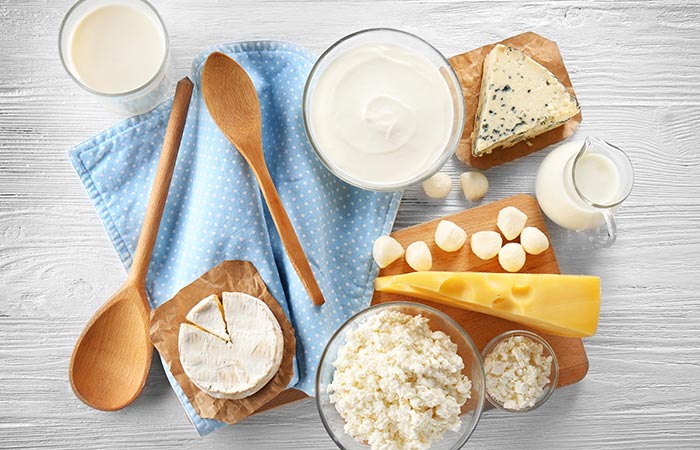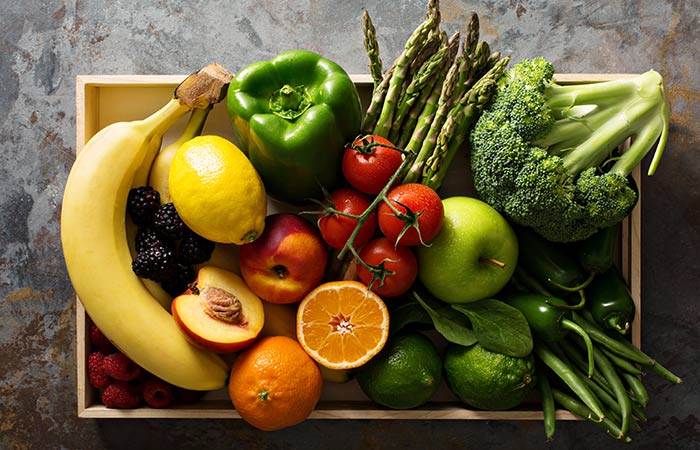Dopamine is a neurotransmitter – a chemical released by the neurons to send signals to other nerve cells. What makes it unique is the way it makes you feel – euphoric and blissful. Dopamine is also called the feel-good hormone, and its release basically means good news! But can you control its release? Can certain foods help you do that? Scroll down to find out!
Table Of Contents
- What Role Does Dopamine Play?
- Which Foods Boost Dopamine Levels?
- What Are The Effects Of Excess Dopamine?
- What Are The Effects Of Dopamine Deficiency?
What Role Does Dopamine Play?
Dopamine is released by the dopaminergic neurons located in the midbrain. These neurons, though few in number, play an important role in mood, addiction, reward, and stress (1).
Dopamine also plays a role in learning, working memory, motivation, and decision-making. It controls movement too – and its deficiency may be one of the causes of Parkinson’s disease, schizophrenia, and attention deficit hyperactivity disorder (2).
The anticipation of a reward increases brain dopamine levels. Many addictive drugs also increase its release from the neurons. This is one reason most addicts have a hard time quitting drugs.
Hence, dopamine plays a critical function in brain health. But how can you increase dopamine levels naturally? Well, the best way is to eat foods that boost dopamine levels.
Which Foods Boost Dopamine Levels?
1. Dairy Products
These include everyday foods like cheese, milk, and yogurt. Cheese contains tyramine, which is converted into dopamine in the human body (3). Foods containing probiotics, like yogurt, also boost dopamine levels (4).
2. Nuts
Nuts rich in vitamin B6 help as this vitamin helps your brain produce dopamine (5). Walnuts and hazelnuts are good sources of vitamin B6. Walnuts also contain DHA, an omega-3 fatty acid, which is responsible for the modulation of dopamine concentrations (6). Walnuts and almonds are good sources of folate, which also helps produce dopamine (7).
3. Omega-3 Fatty Acids
In rat studies, omega-3 fatty acids were found to normalize dopamine levels and reduce the development of anxiety-like behaviors (8).
In another study, oral fish oil treatment was found to restore dopamine release after traumatic brain injury (9).
Foods rich in omega-3 include salmon fish, walnuts, and chia seeds.
4. Dark Chocolate
Studies show that chocolate may interact with a number of neurotransmitters, including dopamine. Dopamine is released after eating dark chocolate and imparts a pleasurable sensory experience (10).
5. Fruits And Vegetables
In a study, rats supplemented with strawberry and spinach showed a significant enhancement in dopamine release. The study suggests that in addition to the antioxidants, the other nutrients in fruits and veggies may also contribute to dopamine release (11).
Even bananas were found to have high levels of dopamine – more so in the peel and pulp. Avocados and velvet beans also contain dopamine. Other fruits and veggies containing dopamine include oranges, apples, peas, tomatoes, and aubergines (12).
6. Coffee
Like most other wake-promoting drugs, the caffeine in coffee enhances dopamine signaling in the brain (13). Caffeine’s main targets in the brain are the adenosine (a brain chemical that dampens brain activity) receptors. It works on these receptors and sets off a chain of events, which eventually affects dopamine levels and lights up the areas of the brain associated with pleasure and thinking (14).
These are the top foods that can boost your dopamine levels. But hold on – is there anything like too much dopamine?
What Are The Effects Of Excess Dopamine?
Excess dopamine levels in the system can lead to paranoia and withdrawal from social situations. They can even lead to impulsive behaviors.
Dopamine also plays a role in inhibiting prolactin (a hormone) secretion by the pituitary gland – which may otherwise cause menstrual disorders and infertility (15). Excess dopamine may not be able to effectively inhibit prolactin, leading to these issues.
But worry not – dopamine overdose is likely to happen only if you take the hormone intravenously (which is often the case with individuals who are deficient in dopamine).
The normal dopamine ranges are 0 to 30 pg/mL (picograms per milliliter).
What if your dopamine levels go below these ranges? Well, that causes problems too.
What Are The Effects Of Dopamine Deficiency?
Dopamine deficiency is linked to certain mental disorders, though they are not found to cause the condition directly. Some of these mental disorders include Parkinson’s disease, depression, schizophrenia, and psychosis.
Following are the symptoms of dopamine deficiency:
- muscle cramps or tremors
- loss of balance
- weight loss or weight gain
- low energy
- inability to focus
- feeling fatigued
- feeling demotivated
- low sex drive
- moving or speaking slowly than usual
- difficulty eating or swallowing
- trouble sleeping
- suicidal thoughts
Conclusion
Dopamine is an important neurotransmitter, and it is important you have it in adequate levels. The foods we listed here are part of a healthy diet. Of course, caffeine could be an exception – as you shouldn’t binge on it. Otherwise, eating plenty of nuts and fruits and veggies regularly will ensure your dopamine levels are optimal.
What do you think about this article? Any suggestions? Do let us know by leaving a comment in the box below.
FAQ
How is dopamine different from serotonin?
While dysfunction of dopamine is associated with depression, bipolar disorder, and schizophrenia, dysfunction of serotonin can affect your overall mood. Serotonin also plays a much larger role in digestion by stimulating gut contractions for proper movement of food.
References
- “Dopaminergic neurons” The International Journal of Biochemistry & Cell Biology, US National Library of Medicine.
- “Dopamine: the rewarding years” British Journal of Pharmacology, US National Library of Medicine.
- “Dopamine formation from tyramine…” Biochemical and Biophysical Research Communications, US National Library of Medicine.
- “There’s a scientific reason some people are…” The University of Michigan.
- “Effect of vitamin B6 nutrition on the levels…” Neurochemical Research, US National Library of Medicine.
- “Effects of walnut consumption on…” Nutrients, US National Library of Medicine.
- “10 foods that fight stress” Mass Public Health Blog.
- “Omega-3 polyunsaturated fatty acids in...” Clinical Psychopharmacology and Neuroscience, US National Library of Medicine.
- “Oral fish oil restores striatal dopamine…” Neuroscience Letters, US National Library of Medicine.
- “Mood state effects of chocolate” Journal of Affective Disorders.
- “Effect of fruits, vegetables…” The Journals of Gerontology, US National Library of Medicine.
- “Dietary neurotransmitters…” Nutrients, US National Library of Medicine.
- “Caffeine increases striatal dopamine...” Translational Psychiatry, US National Library of Medicine.
- “What is it about coffee?” Harvard Medical School.
- “Prolactin and dopamine…” Journal of psychopharmacology, US National Library of Medicine.
The post 6 Power Foods That Boost Dopamine Levels appeared first on STYLECRAZE.



0 Comments